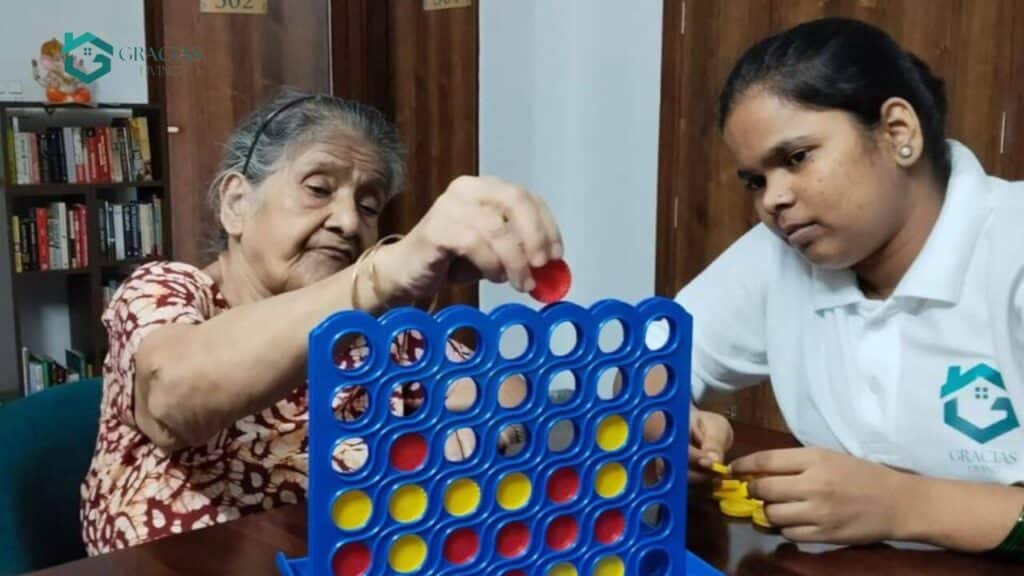Quick Summary of the article:
- Dementia care for parents starts with early diagnosis of dementia, symptom management, daily structure, and gentle cognitive support.
- Dementia care for parents must adapt at every stage to ensure care, safety, comfort, and emotional well-being.
- Dementia care for parents works best with cognitive activities, personalized therapies, memory stimulation, and routine care.
- Gracias Living is the best in dementia care for parents, offering love, support,24/7 support, compassion, and clinical expertise.
- Dementia care for parents becomes more effective when families partner with trained professionals and specialists.
Dementia care for parents is a long journey that needs your love, patience, empathy, and informed decisions.
Dementia progresses very fast, and hence, the needs of your parents also evolve in terms of emotional, cognitive, and physical needs.
At Gracias Living, we provide stage-wise Dementia Care support that helps families in this journey. We are here to walk hand in hand to care for and protect the dignity and comfort of every senior under our care.
In the early stages, your parent may experience memory lapses, mood swings, or confusion. These subtle symptoms may seem manageable, but they can affect day-to-day tasks.
We focus on early intervention, cognitive stimulation activities, memory Games, and emotional reassurance that builds trust and sets the tone for smoother transitions ahead.

As dementia advances, your parent may struggle with language, judgment, and physical coordination.
This stage demands increased supervision and hands-on care. In late-stage dementia, your parent may lose verbal communication, mobility, or even recognition of loved ones. Emotional connections matter most now.
Our advanced dementia care for parents includes:
- Personalized palliative care with pain and symptom management
- Non-verbal therapy methods like music and touch
- Feeding assistance and full ADL (Activities of Daily Living) support
Our dementia care programs support seniors through every stage, while offering families regular updates, mental health resources, and guidance.
How to Help a Parent with Early Dementia and Recognize the Signs of Worsening Symptoms
1. Understanding Early Dementia
When a parent is diagnosed with early dementia, it’s natural to feel overwhelmed.
Early dementia can manifest through subtle changes, such as difficulty in remembering recent events, challenges in decision-making, and occasional confusion.
At this stage, your role is crucial in providing support, ensuring safety, and helping them maintain as much independence as possible.
How to Help a Parent with Early Dementia:
- Create a Supportive Environment: Ensure their home is safe by removing hazards and simplifying daily tasks. Use labels and reminders to help them navigate their environment.
- Encourage Routine: Establish a daily routine that includes activities they enjoy. Familiarity can reduce anxiety and improve their confidence.
- Promote Social Interaction: Keep them engaged with family and friends. Social activities can help stimulate their mind and reduce feelings of isolation.
- Stay Patient and Understanding: Recognize that frustration is a natural response, but try to stay calm and empathetic. Listen actively and validate their feelings.

2. Recognizing the Signs of Worsening Dementia
Dementia is a progressive condition, and as it advances, the symptoms become more pronounced.
Recognizing these changes early can help you adjust care and seek additional support.
What Are the Signs Dementia Is Getting Worse?
- Increased Memory Loss: Forgetting names, places, or recent events more frequently.
- Difficulty with Daily Tasks: Struggling with basic activities such as dressing, eating, or personal hygiene.
- Behavioral Changes: Increased agitation, anxiety, or depression. They may also become more withdrawn or exhibit aggressive behavior.
- Disorientation: Confusion about time, place, or even familiar people.
- Language Difficulties: Trouble finding the right words or following conversations.

3. What is the longest stage of dementia?
The longest stage of dementia is typically the middle stage, also known as moderate dementia. During this stage, the symptoms become more pronounced and disruptive to daily life.
Individuals may experience significant memory loss, confusion, and difficulty with routine tasks. They often require increasing levels of assistance with daily activities and may struggle with the recognition of people and places.
This stage can last for several years, varying from person to person, and marks a period where both the individual and caregivers face substantial challenges in managing the condition.
Moderate-stage dementia symptoms include significant cognitive impairment and mood swings, which impact daily functioning and emotional stability.
In contrast, severe or late-stage dementia (stages 6 and 7) is marked by profound cognitive decline and a complete loss of physical abilities. During these final stages, individuals may struggle with basic bodily functions and require comprehensive, hands-on care.
Managing Nighttime Challenges for Dementia Patients
Addressing nighttime challenges for dementia patients requires a thoughtful approach to ensure restful sleep.
Adjusting the sleep environment, like using soft lighting and comfortable bedding, can make a significant difference.
Additionally, implementing a soothing pre-bedtime routine can help reduce agitation and improve overall sleep quality.

How to Settle a Dementia Patient at Night:
- Establish a Bedtime Routine: Consistency can help signal to their brain that it’s time to wind down. Include calming activities like reading or listening to soft music.
- Create a Relaxing Environment: Ensure the bedroom is comfortable and free from distractions. Soft lighting and a familiar blanket or pillow can provide comfort.
- Limit Stimulants: Avoid caffeine and heavy meals in the evening. Encourage a light snack if they’re hungry before bed.
- Address Their Needs: If they wake up disoriented or anxious, reassure them calmly. Sometimes, a gentle touch or a few comforting words can make a big difference.
- Consider Professional Help: If nighttime disturbances persist, consult a healthcare professional. They can provide strategies or recommend medications to improve sleep.
Choosing the Best Living Situation for a Parent with Dementia
As dementia progresses, you may need to consider different living arrangements to ensure your parent receives the care they need.
This decision depends on various factors, including the stage of dementia, their overall health, and the level of care they can provide at home.
What Is the Best Living Situation for Someone with Dementia?
- Living at Home: Many families choose to care for their loved ones at home, especially in the early stages. This option allows them to remain in a familiar environment with personalized care. However, it requires significant time, effort, and resources.
- Assisted Living Facilities: These facilities offer a balance of independence and support, with staff available to assist with daily activities. They often have specialized dementia care units.
- Memory Care Units: For those in the later stages of dementia, memory care units provide 24/7 supervision and specialized care in a secure environment. These units are designed to meet the specific needs of dementia patients.
- Nursing Homes: If your parent has complex medical needs, a nursing home with a dedicated dementia care program may be the best option. These facilities provide comprehensive medical care alongside dementia support.
- Respite Care: If you need a temporary break from caregiving, respite care options are available. These can range from in-home care to short-term stays in a facility.
Conclusion
Caring for a parent with dementia demands flexibility and dedication. It also demands adapting to their changing needs while maintaining a supportive and compassionate approach.
Staying informed about their condition and accessing specialized resources can make a significant difference.
Building a network of support from healthcare professionals and community services helps ensure both your parent’s well-being and your own, making the caregiving experience more manageable and fulfilling.





